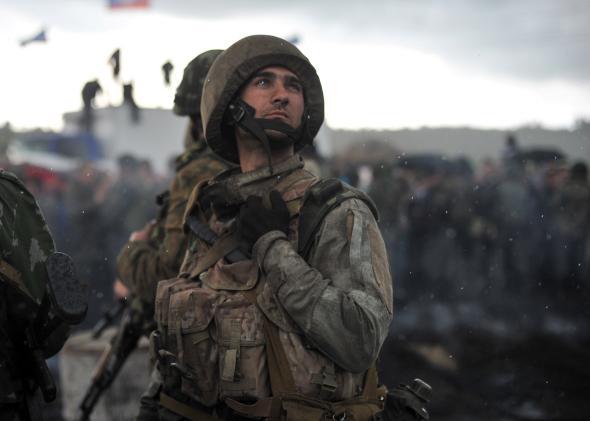For the past few weeks, the big question on everyone’s mind when it comes to the crisis in Ukraine has been whether Vladimir Putin would be willing to send Russian troops across the border to annex territory. But at the moment, it appears that he really has no need to.
The big news of the morning is that pro-Russian rebels managed to shoot down two Ukrainian helicopters, dealing a serious blow to Kiev’s most concerted effort yet to use military force to recapture the rebel-held city of Slavyansk. Operations around the city now appear to have ceased.
The latest Ukrainian offensive came just days after acting President Oleksandr Turchynov conceded that his country’s dysfunctional and depleted security forces are “unable to quickly take the situation in the Donetsk and Luhansk regions under control.” This is not the sort of thing leaders generally say on the brink of a military offensive, and as Gideon Rachman suggests, the latest offensive seems more like a last-ditch face-saving effort than anything else.
“If Kiev failed to act,” he writes, “it would create a self-fulfilling prophecy of loss of control of the East. Russian-backed separatists would be emboldened to grab more administrative buildings and even whole towns. And the general population, regardless of their preferences, would begin to accept that Kiev’s writ no longer applied in the East.”
The offensive could yet, as feared, trigger a full-scale Russian invasion—the Kremlin says the deal reached in Geneva last month is now off—but given how successful the current Russian strategy has been, that may not even be necessary.
As long as the separatists, almost certainly acting under the backing if not the outright direction of Russian special operaions forces, can continue to withstand the tentative offensives launched against them, Kiev’s loss of control over Donetsk and Luhansk will become an established fact on the ground. As Interpreter editor James Miller points out in a commentary for Vice, the key player in this is not the military but the Russian government’s well-oiled propaganda machine, which has been operating at full force in eastern Ukraine, convincing many pro-Russian locals that “Ukraine is being overrun by ultranationalist Nazis who are building concentration camps for ethnic Russians and regularly lynching Russian sympathizers.”
Tens of thousands of Russian troops are still massed on the Ukrainian border, and there’s little sign that they’re leaving, but at the moment Russia can simply leave them in place as a warning of what would happen in Ukraine launched a full-scale assault to retake the contested areas—a campaign that would almost certainly involve large numbers of civilian casualties.
For the moment, the separatists can simply continue to consolidate their gains in the regions they already control, while slowly expanding beyond them. Reports of violence this morning suggest that the southern port of Odessa may be the next flashpoint. Ukraine also now faces the very likely prospect of holding elections later this month in which large chunks of country will not participate.
It’s still possible that the latest events could be the trigger for the much-feared Russian invasion, but it also seems likely that Moscow will simply allow special operations forces and Ukrainian separatists to continue destabilizing the country and send in the army—if at all—only after their control of these areas is a fait accompli.
Given that the damage inflicted by international sanctions appears to be limited so far, Putin can afford to be patient.
